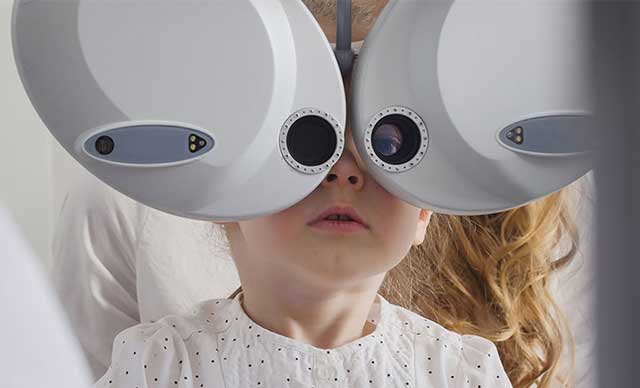
Gateway Low Vision Helps Juvenile Macular Degeneration Patients From St. Louis and the state of Missouri Regain Visual Acuity
What Is Juvenile Macular Degeneration?
Macular Degeneration is a form of vision loss that typically affects people age 60 and above, but there is a younger form of this disease called Juvenile Macular Degeneration. This eye disease affects the macula of the eye, which in healthy eyes, acts as a passageway as light passes through it on the way to the brain. The brain then interprets this light and processes the images so that you can understand what you’re seeing.
For young people with Juvenile Macular Degeneration, it can be particularly difficult because it impacts them in childhood through their 20s. School-age children often struggle with reading, writing, schoolwork, extracurricular activities like sports, dance, or art, and more.
How a Low Vision Doctor Can Help
 At Gateway Low Vision, we can give your children the tools they need to succeed in school and in life. If your kids have trouble with reading comprehension, focus, and concentration, doing computer work, or other kinds of daily tasks, talk to our low vision doctor.
At Gateway Low Vision, we can give your children the tools they need to succeed in school and in life. If your kids have trouble with reading comprehension, focus, and concentration, doing computer work, or other kinds of daily tasks, talk to our low vision doctor.
Does your teenager want to start driving lessons? Don’t count them out of driver’s ed just yet; we can help with that.
Dr. Jill Mogil can work with your child to provide them with the latest and most effective low vision glasses and devices. These can maximize their vision by magnifying text and making words and images sharper and more clearly defined.
What Causes Juvenile Macular Degeneration?
Juvenile Macular Degeneration is inherited genetically, so if a parent has the condition, it’s likely that their children will have it from birth. The disease is related to a damaged macula, which is responsible for passing light onto the retina on the way to your brain. For those with Juvenile Macular Degeneration, this natural flow is disrupted, so the brain can’t process the images they see, and central vision is affected.
What is central vision? This is what you see when you look straight in front of you without moving your head. Everyday tasks like reading, writing, using a computer, driving, or watching TV are difficult for a young patient with Juvenile Macular Degeneration.
Juvenile Macular Degeneration and Low Vision
 Our young patients tell us that they can’t see clearly in dim lighting, they have persistent blurry vision, and they’re unable to see sharp colors very well.
Our young patients tell us that they can’t see clearly in dim lighting, they have persistent blurry vision, and they’re unable to see sharp colors very well.
If your child has Juvenile Macular Degeneration, don’t lose your hope! They can live a vibrant, independent, and high quality of life, even with vision loss. Gateway Low Vision provides children and teens with a variety of low vision glasses and devices. A range of options are available that have proven to be extremely helpful for enhancing vision in young people with Juvenile Macular Degeneration.
If Macular Degeneration runs in your family, early detection and diagnosis is essential for getting your kids the right treatment. Let us help you get there.
Treatment for Juvenile Macular Degeneration
Treating Juvenile Macular Degeneration involves a comprehensive eye exam and a detailed discussion of your child’s needs. Dr. Jill Mogil will determine the exact amount of vision loss and talk to you and your child about their lifestyle. Are they active in sports or theater? Do they love to read or play computer games? These kinds of questions can help us give them the best low vision devices and glasses to get them back to doing the things they love.
How We Can Help
At Gateway Low Vision, we help our young patients live their best lives. Living with vision loss from Juvenile Macular Degeneration doesn’t have to be a painful experience. With the right approach and advanced technologies, we can help them maximize their remaining vision so that they can do the things they love.
Schedule a consultation at our office today and see the difference for yourself.
